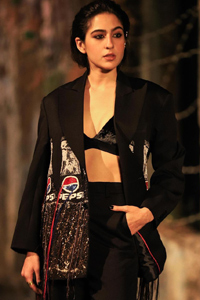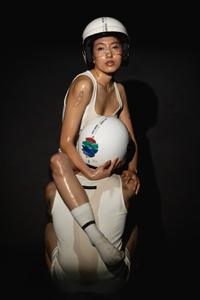WHAT do you think of when you think of Indian fashion? A gamut of beautifully embroidered bridal wear, silk saris, or the new and fabulous handloom chic heritage we have made so contemporary lately.
But what if one would introduce you to a label that specialised in graffiti prints, subversive art, blood-infused dyes, devil’s horns for textures and gorillas for inspiration. It may sound outlandish, but Huemn (pronounced ‘human’, an homage to humans of all hues), the Indian ready-to-wear label, is now 12 years old and has a strong fan base that’s almost a cult.
Founded by two friends who met at NIFT Bangalore, Pranav Kriti Misra and Shyma Shetty, Huemn just celebrated a new collaboration with Hunter by Royal Enfield, one of their many edgy tie-ins.
The two wanted to make handcrafted clothing, but clothes that they would wear and their friends would wear every day. In a bid to be inclusive, and build a community for those without one, Huemn’s clothes are unisex. They also draw from social, political and cultural landscapes of India.
“We wanted to be authentic,” Misra, 39, also a published Hindi poet, tells me the morning after a late-night rager in a dive Mumbai bar celebrating his new collaboration. “The effort was to be better as individuals and artists. We were sponge bags around our friends, absorbed their worlds and made a reflection of that. This is why we have been through sports luxe, androgyny, pantsuits and street… we are all of them at some point or the other, and I have no idea who we will be next.”
“Our ideology doesn’t change, but like we get a haircut to give ourselves a new look every now and then,” he smiles.
At its core, Huemn is a story, not just a brand. “We are storytellers first, the brand and the product are just by-products. My father was a poet and I am a small-town boy from Lucknow. I got into fashion for the glamour. It’s when I learned more, I was drawn to its crafts and techniques. But now, even my sales team has been trained in solving a customer's problem, telling him a joke, just making his day. A purchase is a relationship,” he explains.
This is how Huemn has built a cult of diversity. At their party, much of subaltern Mumbai arrived. People who didn’t fit in. They wore Huemn tshirts, ripped jeans, hoodies with Pepsi cans and gorilla prints. They wore tattoos and piercings and coloured hair too. “Our clothes invite everyone. A tshirt is oversize and can be worn as a dress by a woman. They cost Rs 5,000, so they are our entry-level products.”
For Hunter, Huemn has designed two jeans, two sweatshirts and three tshirts, along with one helmet. The helmet is most exciting, Misra says, as it opens up a new world to them that isn’t familiar with their fashion. Like they did with the Pepsi can when we collaborated with them in 2022. The only other designer Pepsi has made cans with is the American Alexander Wang. They have also collaborated with Absolut vodka. “It’s a learning curve to sit opposite people from the corporate world and think like them,” he smiles.
For a lark, and perhaps a marketing gimmick, Huemn launched a bottle of perfume last December with Olfa perfumes. “We just made 500 bottles. But I wanted a particular smell of Indian spices. The top note is red chilli and then the florals and oudh follow,” he says.
“At Huemn, we use the 70:30 method, that 70 percent of the outfit must be familiar to the customers, 30 percent can be inventive. Fashion is so intimidating as it is, we want people to find their comfort zones,” he explains. “I also cannot understand how designers can charge Rs 18,000 for tshirts. We need an Indian sense of ‘premium’, not a European one. Huemn is a small brand but our intent is to understand our land and its problems, and help solve those problems. That, in its true sense, is what fashion inclusivity is about.”




